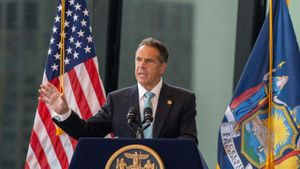Indonesia is ramping up its efforts to strengthen bilateral economic ties with several countries as it seeks to expand its influence and boost its economy through strategic partnerships. During the Asia-Pacific Economic Cooperation (APEC) summit held on November 15, 2024, Indonesian President Prabowo Subianto took center stage, engaging with leaders from New Zealand and Canada to spark discussions on strengthening economic cooperation.
Prabowo met with New Zealand Prime Minister Christopher Luxon on the sidelines of the APEC summit in Lima, Peru. The meeting underscored the two countries' mutual interests in enhancing trade ties and collaboration. Particularly, economic cooperation on agricultural products and green innovation were highlighted. Prabowo expressed his desire for the ratification of agreements aimed at exploring renewable energy sources and environmentally sustainable practices.
"New Zealand has made remarkable strides in agriculture and environmental preservation, and we believe there is much to learn and share," Prabowo stated, indicating Indonesia's openness to integrating sustainable practices.
A few hours earlier, President Prabowo held another significant meeting with Canadian Prime Minister Justin Trudeau. This interaction also took place at the APEC conference, where discussions centered around the nearly finished negotiations of the Indonesia-Canada Comprehensive Economic Partnership Agreement (ICA-CEPA). This agreement is poised to significantly bolster trade between the nations, touching sectors such as agriculture, manufacturing, and renewable energy.
"The ICA-CEPA will forge pathways for increased trade and strengthen our supply chains, which is especially important as we deal with global economic challenges," Prabowo said during the meeting.
Coordinated by Airlangga Hartarto, Indonesia's Coordinated Minister for Economic Affairs, the partnership aims to capitalize on Indonesia's youthful population and resource wealth, positioning the country as a pivotal player for Canadian businesses targeting Southeast Asia.
Following these high-profile meetings, President Prabowo's agenda also included engaging with Peru's President Dina Boluarte. The Indonesian leader confirmed plans for enhanced bilateral cooperation, focusing on cultural and economic sectors. Both countries are set to finalize their own Comprehensive Economic Partnership within the next six months, demonstrating commitment to fostering deep-rooted relationships.
Praising Peru, Prabowo mentioned, "We hope to build strong bilateral relationships as part of our collective multilateral efforts." Their joint commitment includes addressing narcotics trafficking and promoting regional peace and stability.
One notable outcome of the Lima visit for Prabowo was receiving the prestigious Grand Cross of the Order of the Sun of Peru, which is Peru's highest honor. Awarded directly by President Boluarte, this accolade recognized Prabowo's contributions to building Indonesia-Peru ties. He received the prestigious insignia at the official ceremony, emphasizing the significance of the bond between the two nations.
Historically, Indonesia is the largest economy within the ASEAN bloc, and its efforts to broaden partnerships come at a time when global trade dynamics are shifting rapidly. Prabowo's aggressive push to ink trade agreements reflects the growing recognition of Indonesia's strategic position and underlines the country’s proactive stance on international cooperation amid rising protectionism and geopolitical tensions.
On the homefront, discussions surrounding the ICA-CEPA have stirred excitement among Indonesian and Canadian businesses alike. The agreement aims to pave the way for cooperation not just economically but also socially and environmentally, improving food security, agricultural cooperation, and innovation.
Airlangga emphasized, "The ICA-CEPA negotiations have been substantially concluded, and we are hoping to sign the Joint Ministerial Statement during the visit of Canadian Trade Minister Mary Ng to Jakarta on December 2, 2024." He expressed optimism over the expected outcomes from this partnership and its potential to enrich economic engagement particularly by promoting sustainable industries.
The ICA-CEPA is considered instrumental for Indonesia as it diversifies its economic connections beyond regional neighbors, integrating with North American economies. This is timely, considering Canada’s strategic interest to strengthen its presence within the Indo-Pacific region as it seeks alliances against the tumultuous trade backdrop shaped by U.S.-China relations.
Indonesian leaders have acknowledged the challenges posed by global market fluctuations, but they remain undeterred. With the country's vast resources, sizeable workforce, and growing consumer market, many see Indonesia as the next big player on the global economic stage. This year’s APEC is not only seen as another diplomatic meet but rather as Indonesia's declaration to encourage foreign investments by showcasing its commitment to sustainable development and economic partnership.
Throughout the summit, the topic of sustainable practices remained prevalent, as countries collectively pivot toward greener energy and technologies. Prabowo outlined Indonesia's aspirations to transition fully to green energy, which could serve as another cornerstone for future economic ties. The President also called for collaborative ventures particularly within the renewable energy sector, citing Indonesia's dedication to attaining realistic climate goals.
While Indonesia is working hard to negotiate these economic agreements, its broader strategy revolves around being part of international conversations concerning trade cooperation and climate change. The nation is positioning itself as both product-centric and service-driven, capable of adapting to and influencing global market trends as seen through its dealings with Canada and beyond.
With both bilateral and multilateral ties to navigate, Indonesia is moving forward with ambitious plans to establish itself firmly on the international economic map. If successful, the outcomes from these negotiations at APEC could initiate substantial economic growth and pave the way for lasting relationships on the global stage.
The developments from the APEC summit signify more than diplomatic pleasantries; they represent Indonesia's advancing vision to secure its economic future, leverage its strengths, and address both domestic and international challenges head-on.



